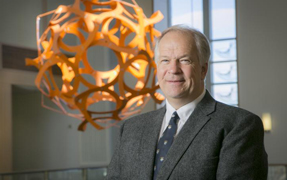In the early 90s television series Quantum Leap, scientist Sam Beckett gets trapped in time and spends each episode hopping between decades and human bodies, making decisions that change the course of the person's life. As much as I enjoy the show (it holds up surprisingly well), the scriptwriter's choice to use "quantum" in the title is scientifically questionable. But it was the early 90s. Who knew what quantum meant, anyway, aside from a small group of theoretical scientists?
Although real quantum physics has little to do with time travel, the writers might have been alluding to the quantum state of superposition, which allows a particle to be in more than one state, simultaneously, kind of like Sam Beckett. If that's what they were going for, then it isn't an entirely wrong use of the word quantum, if you were to throw it into the whirlpool of everyday vernacular.
Which makes me wonder: is quantum now part of the everyday vernacular? When did "quantum" move out of the jargon of a very small and special community of physicists and into the mainstream?
This movement from obscurity into the Oxford English Dictionary (OED) happens often—often enough that the OED announces monthly new additions to the dictionary. In the last decade, hundreds of new words have been added, including nomophobia (fear of being without a phone), app drawer, ransomware, Twittersphere, and emoji. As evidenced by this list, many of the latest additions are related to the slang around our rapidly evolving technology, but even science terms join common usage from time to time. In 2019, the word "Goldilocks" was added to the OED, specifically in reference to the object of the TESS exoplanet mission: to find planets neither too hot, nor too cold, to support life. In 2020, many of the OED's new words are related to COVID-19.
In the 2010 movie The Social Network, there's a scene where a young woman invites Facebook co-founder Eduardo Saverin to "Facebook me," and he is delighted to realize that Facebook has just reached the tipping point of ubiquity where a noun becomes used as a verb. This actually happens fairly often (just Google it), and it happens for some words faster than others.
The word "quantum" has been in the OED for over a century (see this issue's Luminary article about Max Planck and Albert Einstein). What's new is that the public—nonscientists, even—recognize it, to some degree. And that's not just because of Sam Beckett.
Even though there are few viable quantum products at this point, governments are betting big on its potential. The US Department of Energy and National Science Foundation are investing over $1 billion in dozens of new quantum research centers. The UK's National Quantum Technologies Programme funded a national network of quantum technology hubs with a £214 million investment. Beijing is investing billions in quantum research in China, which had twice as many patent filings in 2017 as the United States for quantum technology. Enormous institutions, like Goldman Sachs, are looking to hire a new hybrid of quantum physicist software engineer so that they will be ready to harness quantum computing and communication for future applications not yet entirely understood.
Although quantum has not yet made the linguistic jump from noun to verb, it's worth considering that a verb is a part of speech defined as an action, a state, an occurrence. And by that definition, we may soon make the leap to being quantumed.
Gwen Weerts, Managing Editor, Photonics Focus




